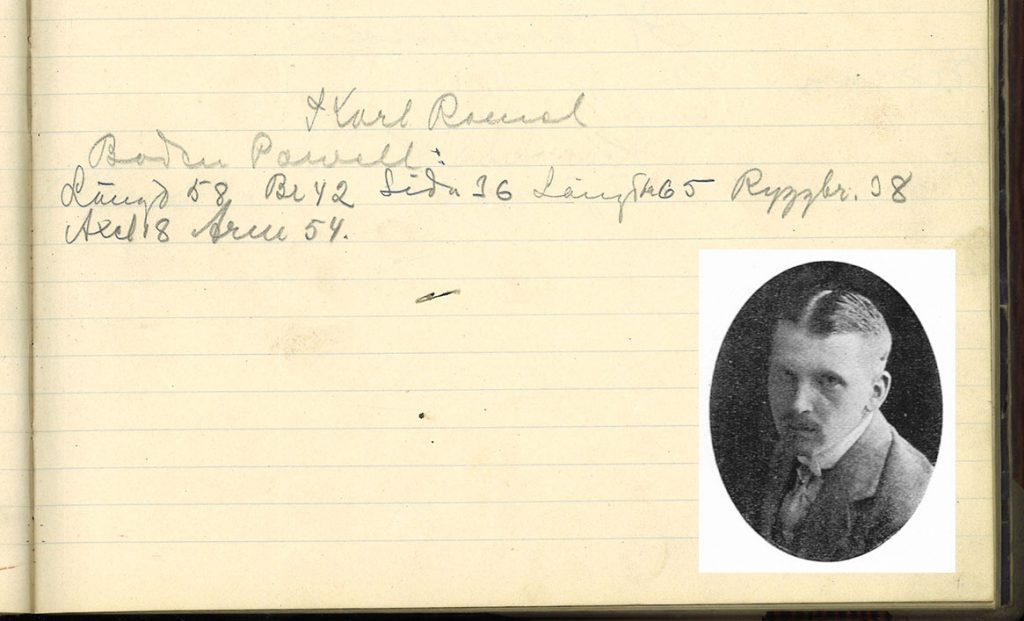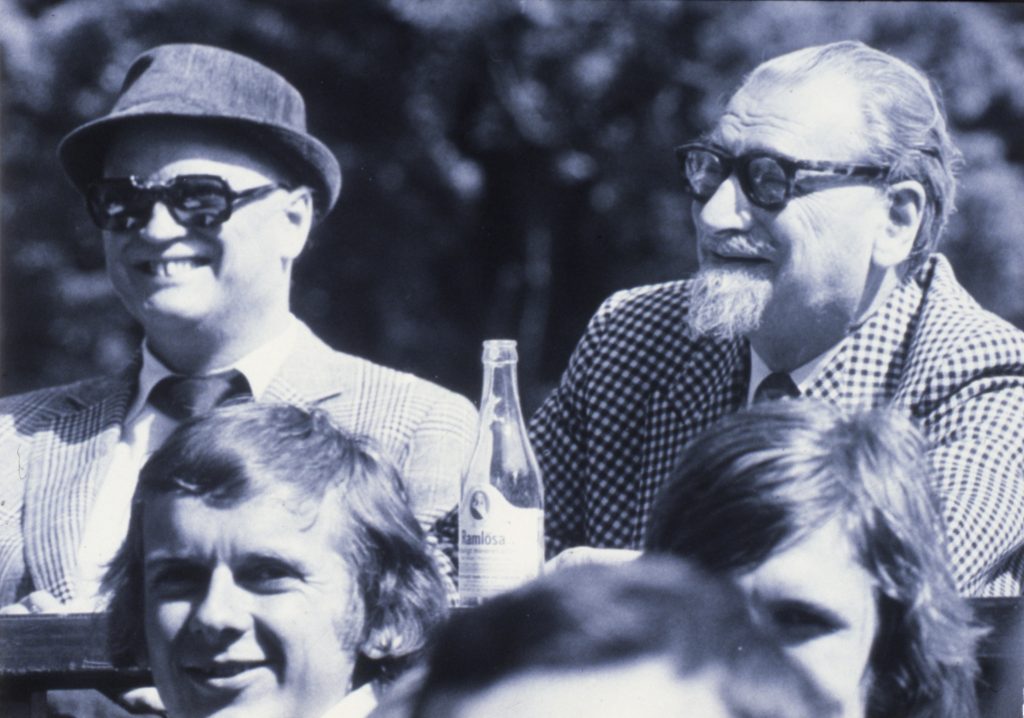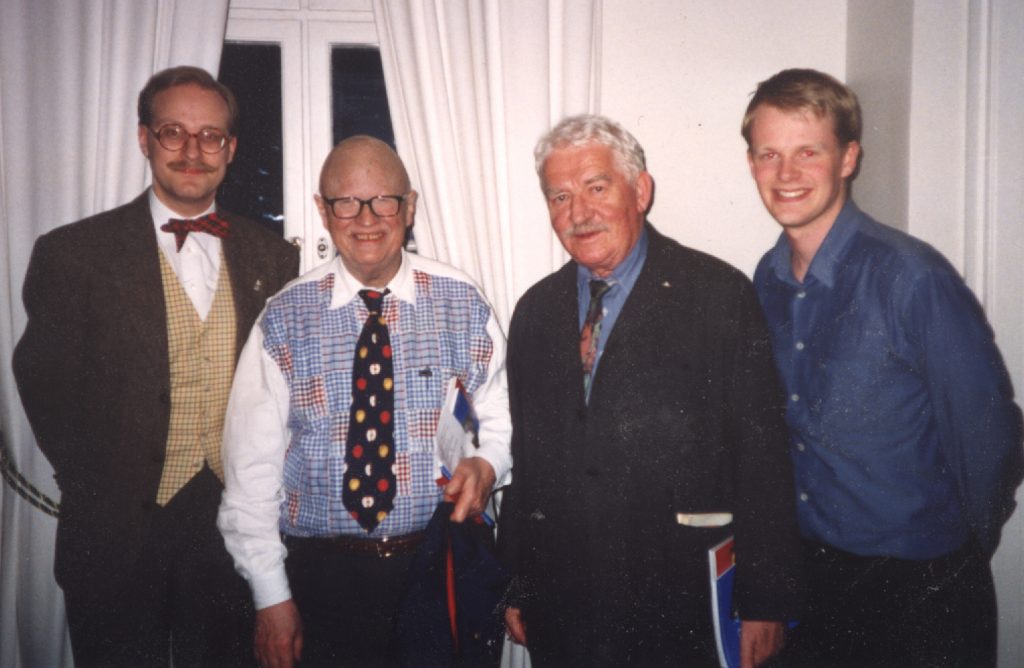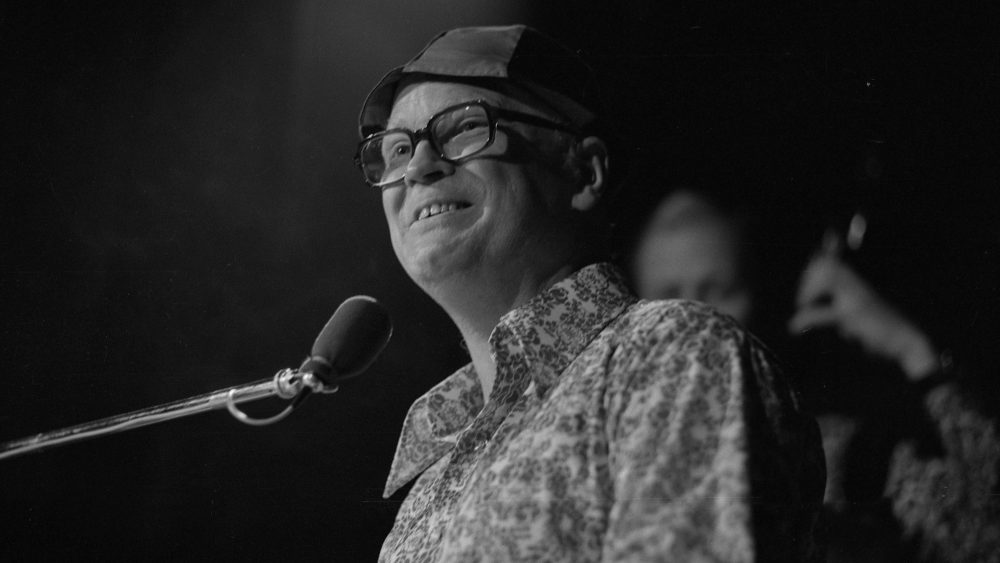There cannot be many people in Sweden who failed to notice this year – and in particular this summer – that there was a centenary celebration of the birth of one of the greatest Swedish entertainers of the 1900s: Povel Ramel, born on 5 June 1922. The celebrant has been posthumously acclaimed with everything from a postage stamp issue and a two-hour TV special on SVT to a number of live shows around the country featuring material from his rich output, including several in Lund, where there is also an active local branch of the Povel Ramel Society, which preserves his memory.
But – sticklers for relevance may ask – is a publication for and about alumni from Lund University really the right forum to highlight Povel Ramel, no matter how popular he was – since he never studied in Lund? No, it is true: Povel studied neither in Lund nor at any other Swedish university. The fact is that he did not even complete secondary education, as he chose to drop out when he was at grammar school. In addition, he was born and raised in Stockholm, went to school in Sigtuna and lived the greater part of his adult life on the island of Lidingö – all at a substantial distance from the university city of Lund. Nevertheless, I consider there are reasons to claim that there are fully sufficient links between Ramel and academic Lund to justify this article.
A distinctive audience
One such natural link is, of course, that as an artist frequently on tour, Povel Ramel performed several times in Lund. In his memoir, Som om inget hade hänt (1999), when he reflects on how audience behaviour varies between places, the Lund audience gets a top grade:
Of course, Lund with its proximity to Malmö and its sprinkling of sprightly university folk cannot be regarded as a truly small town. There, I have also encountered a particularly appreciative audience every time, but also noted that the reactions to my shows have come in unusual places.
For example, Wenche Myhre and I performed POW SHOW II at the Academic Society’s main auditorium. Our rap number “I dig you” contains a line that describes our exact relation to clothes and manners: “Potatoes like potatoes, yum, yum, yum”. Before, that line had usually passed by unnoticed, but in Lund it sparked an enormous laugh, just in Lund, just that time – nowhere else, ever!
It could also be claimed that Povel Ramel had a deeper connection and affiliation to Lund in the form of his link to the heritage of humour. The fact that one of the great and style-forming Lund humourists Axel Wallengren – alias Falstaff, fakir – was one of Povel’s sources of inspiration is no secret. It is something that Povel himself pointed out by describing a whole section of his book Min galna hage (1957) as having been produced in a “strong Fakir-inspired state”. There are further examples of both direct borrowings from, and allusions to, Falstaff, fakir in Ramel’s texts, but above all a deeper, spiritual affinity between the two humourists has been creditably examined by the Lund-based cultural writer Lars Westerberg (“Povel Ramel och Fakiren och den humoristiska kungslinjen”, published in Fakirenstudier XXII, 2008).
Lund Faculty of Law alumni in the family
However, Ramel’s Lund links existed not least in a large number of friendship ties with people in Lund, most of them with a deep connection to the city’s student life. This article will cover a selection of these personal connections between Povel and academic Lund.
The earliest Lund connections in Ramel’s life can be found in his own family. This is not so remarkable as the original Pomeranian and subsequently Danish noble family Ramel was already well established in Skåne when the province became Swedish. Over the centuries, the Ramel family have owned and lived in a large number of manors in Skåne such as Bäckaskog, Maltesholm, Widerup and Övedskloster, and many of the family’s children were sent to study at Lund University. A modern example is Fanny Ramel – carnival general in 2014. Going further back, Povel’s father, Baron Karl Johan Henrik Ramel, born in 1889 in Löberöd, was enrolled as a student in Lund in the autumn semester of 1908. Karl Ramel would spend five years in Lund and during that time complete Bachelor’s degrees in both Philosophy and Law. This was particularly impressive as in parallel he was also training to become an army officer: Ramel senior became a sub-lieutenant in 1909 and a lieutenant in the reserve forces in 1914, as part of the Wendes Artillery Regiment. Although obviously diligent in tackling this range of studies, it clearly did not prevent Karl Ramel from also participating in the amusements of student life. The carnival procession in 1912 included a group of students portraying scouts, and a list of participants in the Academic Society archive shows that Karl Ramel was chosen to play the founder of the Scouting movement, Lord Baden-Powell.

(Source: Academic Society Archive & Student Museum and the photo database Swedish Portrait Archive).
We do not know how much Karl subsequently told his son about student life in Lund, but we do know that they shared the same sense of humour. This is evident from privately recorded 78 rpm records on which the father and son performed sketches together. The father’s more long-term influence on Povel would, however, come to a tragic end: he and his wife Märta died of complications from a car accident when Povel was just a teenager.
However, there was another close relative with a Lund connection: Povel’s eight-year older half-brother Wilhelm Stiernstedt. In his first memoir, Följ mej bakåt vägen (1992), Povel describes the considerable influence of his elder brother: “I have used his know-how, his thought processes, his views on things, his way of speaking and very special wit for as long as I can remember”, writes Povel. Furthermore, he states that his brother spent time “partying in Lund”, yes “even over-partying, if we are being honest”. Exactly what this meant for Povel is not something he goes into in his memoirs, but he did, however, when taking part in a crowded student evening in Lund in 1999: that his brother Wilhelm was in Lund meant that Povel had plenty of reasons to visit the city at a young age, even though it wasn’t to study. No, declared Povel: it was during these years, with visits to parties and carnivals, that for him Lund became synonymous with celebrations. “I have never taken a serious breath here”, he happily confessed.
A gem from Skåne
In addition to purely familial connections with the city, Povel Ramel would build up a large circle of friends in Lund over the years. A prominent place in this circle was taken by a man who Povel first met in Malmö in 1948 while participating in one of his earliest revues – a show produced by the former Lund spex performer and carnival general in 1946 “Dubbel-Olle” Ohlsson (like Povel’s father Karl and brother Wilhelm a Lund Faculty of Law alumnus) – and who went by the name of Sten Broman. Povel described him as “a gem from Skåne”.
This is not the place to go into a detailed account of the friendship between Sten Broman and Povel Ramel. This is covered in a chapter of the previously-mentioned memoir Som om inget hade hänt and in a chapter by Povel in the book Sten Broman – En man med kontrapunkter (1984). However, suffice it to say that Broman was definitely one of those who very actively helped to regularly attract Povel to Lund. This certainly applied to Lund carnivals, where for many years the two friends could be seen together on the jury for the student orchestra competition that traditionally opens the event. In the carnival context it can also be mentioned that Povel took part in not one, but two, carnival films: “Men hur?” (1962) and “Lystnaden” (1966). The latter was connected with an event organised by Sten Broman and Uarda-akademien, called “Höje å-bragden” (an attempt to reach Lund by boat), which played an important role in the film.

Photo: Hagblomfoto (Source: Lund University Library).
Broman could not reasonably admit Povel to the spex performers’ academy, Uarda-akademien, which he had himself founded, but could to another society he established – the Gastronomic Academy. Here, Broman and Povel were in the company of another prominent but somewhat older alumnus of Lund University and its Faculty of Law, Fritiof Nilsson Piraten. He was also among Povel’s Lund friends. Povel has recounted that when they first met, Piraten started their conversation by saying “I knew your father – very well”. A good icebreaker certainly, but possibly also a sign of Piraten’s lack of respect for the truth at times, considering that Piraten did not start his law studies in Lund before the spring of 1914 – the semester after Karl Ramel had completed his!
On a bear hunt in Copenhagen
In Povel Ramel’s TV series “Semlons gröna dalar” (1977) a lanky man in black with a plum-coloured top appears now and then in the background without explanation or saying any lines. The role was created by spex performer and Lund Faculty of Law alumnus, Hugo “Låppan” Hagander, a stage persona known for a “very headstrong and expressive way of delivering lines and the body language of a snake-man”. In addition to this TV series, “Låppan” also appeared in minor roles in a few of Povel’s stage productions such as “Dax igen” (1962–63) and “De sista entusiasterna” (1968). The gentlemen socialised privately in contexts such as the small society founded ostensibly for bear hunters in 1962 called “Björnjägarna”. “Låppan” was far from the only Lund figure in this exclusive company. There was also Eric Owers, Lund Faculty of Law alumnus, entertainment manager at Liseberg, carnival general in 1962 and at times Povel’s lawyer, as well as zoology professor and Lund spex performer Bengt-Olof Landin. Something that should be mentioned in this context is the “bear hunt” the gentlemen took part in was at a shooting range at Tivoli in Copenhagen, and that the subsequent food and drink intake probably had a more central role than the hunt itself…
However, the name that must be mentioned, last but not least, in this list of Povel Ramel’s Lund friends is Hans Folke “Hasse” Alfredson. The two gentlemen met for the first time in the 1950s when, as a young volunteer at the Öresundsposten newspaper, Hasse was to interview Povel in connection with a performance in Helsingborg – and by mistake initially interviewed for a long while the above-mentioned brother Wilhelm, who happened to be in the same hotel room! Later, Hasse and Povel would get together in rather more professional forms. Before the comedy duo Hasse and Tage had created their own company Svenska ord, they both worked for Povel’s revue series Knäppupp, and Hasse also appeared in the revue “Semestersångarna” (1961). A lot later – after Tage Danielson’s death – the gentlemen would resume their stage collaboration in the long-running show “Tingel Tangel på Tyrol” (1989–90).

Between Povel’s and Hasse’s public performances they also became close personal friends and it was probably due to this that Hasse Alfredson took the initiative for the above-mentioned student evening 1999 in which he and Povel held a packed audience spellbound at the Academic Society’s main auditorium with anecdotes about themselves and their partnership. Povel had also written a new song as a tribute to Lund, which he premiered to the tune of “Til The End Of The World”. In the song’s introduction, Ramel describes himself as “a kind of happy Pavlov’s dog” with a “tail that wags when I arrive in Lund”, and after listing a number of his Lund acquaintances – most of whom have been previously mentioned in this article – he finished with the following two verses:
Even though I am mostly sober and sound
a party arises in Lund whenever I am around
– The city’s daily attire may be buttoned-up, but there’s always something hilarious showing –
I never studied for a moment
what the old tomes meant –
But, although I have not been here even for a second,
it feels lovely to LAND IN LUND
What Hasse, but not Povel, already knew when this song was performed was the student evening in question would be crowned with a very special Lund honour for the latter. At the end of the official programme, a horde of men and women in white coats rushed forward, in the form of the Academic Society’s “Nasal Committee”. All so as to take a cast of the guest entertainer’s nose – a so-called “nosification” – and add it to the society’s Nasotek; a collection of noses initiated by Hasse himself in 1986. And it is still possible to see Povel’s hooter as “Nose no 90”, surrounded by masses of other noses belonging to various more or less well-known Lund figures. And, regardless of the number of credits that were never earned, can there be any better way of being incorporated in the academic and student fabric of Lund than that?

(Source: Academic Society Archive & Student Museum).
Text: Fredrik Tersmeden
Archivist at Lund University Archives (and Nose no 89, hanging just next to Povel)

